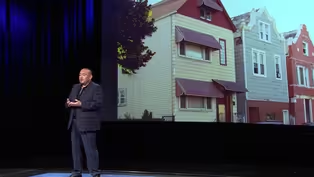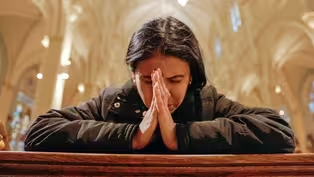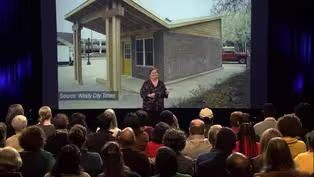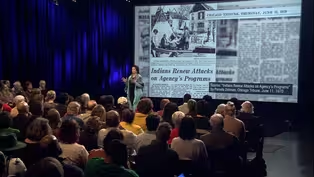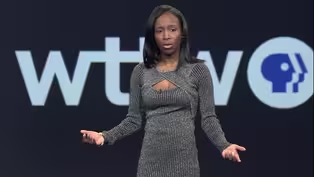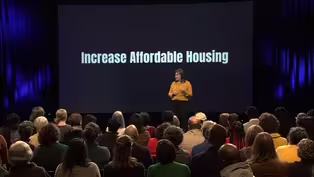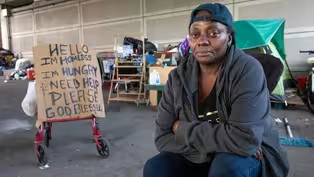FIRSTHAND
FIRSTHAND Talks: Finding a Way Home
Clip: Season 6 | 5m 21sVideo has Closed Captions
Sharday Hamilton shares how public services failed her as a homeless teen mother.
Sharday Hamilton, Youth Board Fellow at National Runaway Safeline, shares how the network of community and public services failed her as a homeless teen mother.
Problems playing video? | Closed Captioning Feedback
Problems playing video? | Closed Captioning Feedback
FIRSTHAND is a local public television program presented by WTTW
FIRSTHAND
FIRSTHAND Talks: Finding a Way Home
Clip: Season 6 | 5m 21sVideo has Closed Captions
Sharday Hamilton, Youth Board Fellow at National Runaway Safeline, shares how the network of community and public services failed her as a homeless teen mother.
Problems playing video? | Closed Captioning Feedback
How to Watch FIRSTHAND
FIRSTHAND is available to stream on pbs.org and the free PBS App, available on iPhone, Apple TV, Android TV, Android smartphones, Amazon Fire TV, Amazon Fire Tablet, Roku, Samsung Smart TV, and Vizio.
Providing Support for PBS.org
Learn Moreabout PBS online sponsorship(gentle music) (crowd applauding) - Don't judge a book by its cover.
We all know that.
But unfortunately, we do that to young people, not knowing they circumstances.
On the night of August 23rd, 2015, my life changed for the worst.
I was at home with my eight-month-old daughter when I heard a strange knock at my door.
To my surprise, it was the Department of Children and Family Services coming to remove my daughter from my care.
I was hurt, I was in disbelief, because now, my daughter is a part of the system I was a part of.
I was adopted when I was two years old.
My adoptive mother was older, in her late 60s when she adopted me, so I was always the talk around town.
I didn't have the flyest clothes, and I didn't get to do the things that my friends did, and worst of all, I was judged because I didn't know my real mother and father.
My senior year of high school, I found out I was pregnant.
My mother had passed away four months before I had my baby.
I had my baby December, 2014.
My mother was the only resource that I knew.
What do I do now?
When I had my daughter, I moved with a friend.
I stayed at a friend house for some months before they put me out.
I was lost, I was hurt.
Where do I go?
The only place I knew to go back to was my childhood home in Harvey, Illinois.
When I went to the home, the home was condemned, but it was home.
I called the neighbor fixer to come turn my water on illegally until the water department came out and put a lock on it.
I believed, since I was back in the neighborhood that I was raised in, that I would have support from my neighbors, but I was let down tremendously.
I went to my neighbors for food, water and things like that, but they turned they backs on me.
I was treated as if I was a nothing, a nobody, and all I was trying to do was take care of me and my daughter.
I did have some friends that I knew in the neighborhood that helped me go to soup kitchens and things like that.
When the night of August 23rd came, I was lost for words.
My heart was broken.
Why would my neighbors call DCFS on me to watch my daughter go through the same thing that I went through?
If this was an unsafe environment for my daughter, why wasn't it unsafe for me?
When they took my daughter, I still remained in a home.
I went back and forth to court, I had to do visits, I did parenting classes.
During this time, I found out I was pregnant again.
I felt worse.
Now I'm pregnant again, I have a daughter in the system, and I'm still homeless.
When January of 2016 came, I went to the police station for help.
They ended up giving me a list of shelters, and I found a Teen Living Program.
When I went there, I saw that it was a drop-in center.
My heart broke, because I needed somewhere that I could stay at continuously until I found housing.
One of the case workers at the drop-in center gave me a paper with different shelters on it.
I called the shelter, it was called The Night Ministry.
The Night Ministry was a pregnant and parenting program.
Due to the fact that I was pregnant, they had a bed available for me.
The Night Ministry was a 120-day program.
I stayed nine months due to the fact that I followed my case management and I was respectful.
When I got to The Night Ministry, I was afraid to speak up and speak out.
My case manager was like, "How can I help you if you don't talk to me?"
Due to the fact that everybody had let me down from people that I knew, I was scared to trust a stranger.
She ended up telling me a story that was relatable to mine.
She opened up to me.
She showed me that there are real genuine people in the world.
She went back and forth to court with me, she helped me do parenting classes, she was a resource on my resume, and me and my son has been housed for seven years thanks to her.
(crowd applauding) Ultimately, I lost my daughter to the system.
She was adopted, but fortunately, we have a great relationship.
I never miss a birthday, me and her and her brother are always together, her adopted family love me as if I was their child.
My kids are my strength, and I do not want them to be judged by they circumstances, but I want them to be valued by who they are.
That is why I do the work that I do, because I do believe youth voices should be heard.
I serve on multiple youth boards and I am the Youth Fellow at the National Runaway Safeline.
It's crazy how so many people turn their backs on you and let you down when you're only human and you just need help.
Thankfully, I have found my way home, and I am committed to helping other young people find theirs.
Thank you.
(crowd cheering and applauding) (gentle music)
FIRSTHAND Talks: The Power of Housing
Video has Closed Captions
Clip: S6 | 7m 39s | Jose Muñoz shares his childhood experience facing homelessness and food insecurity. (7m 39s)
FIRSTHAND: Homeless — The Migrant Experience Trailer
Preview: S6 | 29s | WTTW shares five migrant stories, revealing why they left home, their journeys, and their struggles. (29s)
FIRSTHAND Talks: Tiny Homes, Big Solutions
Video has Closed Captions
Clip: S6 | 9m 34s | Tracy Baim examines the use of tiny homes one possible solution to homelessness. (9m 34s)
FIRSTHAND Talks: Invisible No More
Video has Closed Captions
Clip: S6 | 8m 43s | Shelly Tucciarelli explores affordable housing development for Native Americans. (8m 43s)
FIRSTHAND Talks: Finding a Way Home
Video has Closed Captions
Clip: S6 | 5m 21s | Sharday Hamilton shares how public services failed her as a homeless teen mother. (5m 21s)
FIRSTHAND Talks: Building Our Way Out
Video has Closed Captions
Clip: S6 | 9m 20s | Nicole Bahena puts focus on using available funding to create affordable housing. (9m 20s)
Video has Closed Captions
Preview: S6 | 1m 19s | WTTW offers a look at the unique perspectives and challenging experiences of the unhoused. (1m 19s)
Providing Support for PBS.org
Learn Moreabout PBS online sponsorshipSupport for PBS provided by:
FIRSTHAND is a local public television program presented by WTTW
